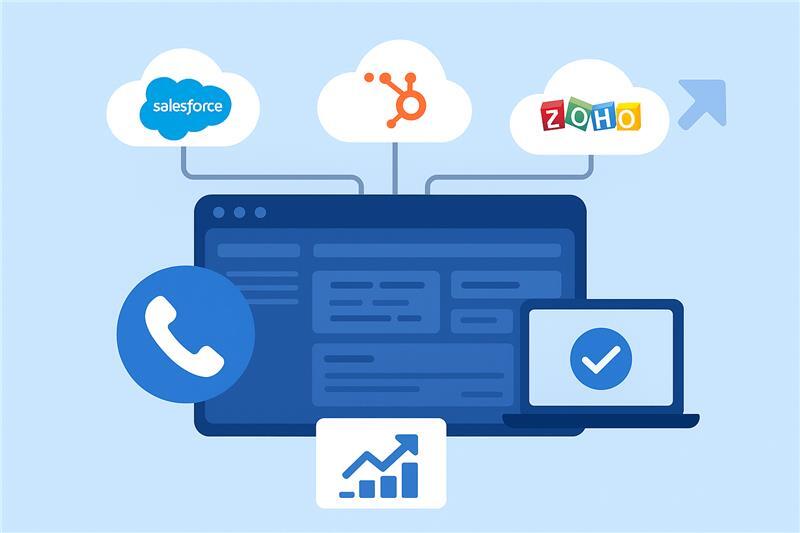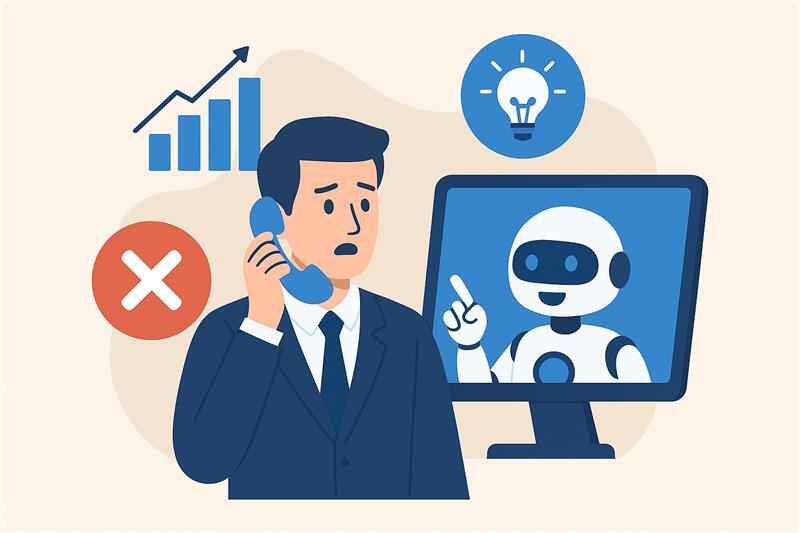
B2B Consultative Sales: Steps and Techniques to Follow in 2025
Did you know that 84% of B2B buyers prefer purchasing from sales reps who understand their goals? This clearly explains that B2B decision-makers want to be understood. This has been the primary concept behind the overgrowing popularity of consultative selling.
B2B consultative selling is about understanding prospects’ needs and requirements before proposing a solution. Here is a comprehensive guide that discusses the what and how of B2B consultative selling to help sales teams.
What is B2B Consultative Selling?
Consultative selling is a B2B sales approach where sales reps focus on understanding prospects' needs before offering them a solution. Unlike traditional sales methods, in B2B consultative selling, a sales rep prioritizes building and nurturing relationships with prospective customers over simply selling a product.
Consultative selling is part of the inside sales process. It helps the sales team go to the depth of customer needs and then offer a compelling solution.
6 Steps of Consultative Selling
B2B consultative selling approach is appropriate for sales reps who prefer listening to the prospects, understanding their businesses end-to-end, building a relationship, and finally pitching the perfect solution.
If you are planning to implement consultative selling at your workplace, here are the six steps to get started with:

Step 1: Research
In the consultative sales process, there is no one-size-fits-all method. Every lead that you generate should be well-researched. Some factors to particularly look for include:
- Size of the organization
- Understanding of products and services
- The web pages they visited on your website
- Their social media profiles
- Competitors
The research step will help sales reps gain as much information as possible regarding the prospective customers. This can help them craft a personalized sales pitch closely aligned with their requirements.
Step 2: Ask questions
Questions play a key role in consultative selling. The more questions a sales rep asks, the better the chances to learn about the business. Asking open-ended questions to the potential customers will provide lots of opportunities to dig deeper. Questions that start with:
- What
- How
- Where
- Who
- When
are open-ended questions. Such questions force the prospects to think more about their company and products and provide comprehensive answers to the sales reps’ questions. Note that close-ended questions where buyers are only required to answer with “yes” or “no” don’t work. The scope of knowing the product closely is less when sales reps ask close-ended questions.
When asking questions, sales reps should not make any assumptions. There is nothing “obvious” in B2B consultative selling. Asking more questions and making zero assumptions are the keys to success.
Step 3: Active listening
Active listening is the cornerstone of B2B consultative selling. Sometimes reps are so keen to ask the next question, that they forget to listen to what the prospects are saying. This can create a huge communication gap in the consultative sales process.
Step 4: Teach or educate
B2B consultative selling is about changing business development executives' traditional selling mindset. Instead of direct pitching, reps can also focus on educating the prospects. This will help the potential customers figure out what they require and increase their trust in the solution sales reps provide.
While teaching the potential buyers, reps should avoid pitching their product right away. Instead, they should put effort into building trust and loyalty by adding value. This not only helps the prospect to learn something new but also helps them build their preference.
Step 5: Qualifying
The ultimate goal of any sales process is to qualify the leads and B2B consultative selling is not an exception. However, this selling approach encourages the prospects to follow any popular frameworks between GPCT and BANT.

If a sales rep follows the GPCT sales process, the steps would involve:
- Goals - Identify the goals of the prospects. The question to ask here is - What do you want to achieve? Also, make sure that the prospect is providing quantitative goals. For example, if a potential customer says - “I want to build an email list”, that’s not enough. A quantitative goal will be - “I want to build an email list of 1000 subscribers within 2 months”. Quantitative goals help the reps to gain clarity and allow them to measure their progress.
- Plans - Once the rep knows the prospects' goals, they should start inquiring about their plans. Specifically, the sales professionals should enquire about the prospects’ plans to achieve their goals.
- Challenges - There are some challenges that prospective buyers are facing while executing their plans. The reps must get a clear idea about those challenges. That way, it will be easier for a sales rep to understand and explain whether their solution can resolve the challenges faced by a potential buyer.
- Timing - Knowing the time frame is also critical. Usually, the potential users mention the time frame while discussing their goals. However, if they miss, reps should ask the turnaround time to achieve the goals.
Alternatively, a sales personnel can also opt for the BANT framework:
- Budget - Asking about the prospect’s budget is always a good idea. This will help the reps get an idea of the buyer's financial situation and they can quote the deal accordingly
- Authority - B2B sales process is long and complex. Several stakeholders are involved, which can create ambiguities for the sales reps. The BANT approach encourages the sales reps to find out who has the highest authority in making the decisions to influence the sales process. This can provide a lot of clarity.
- Need - Sales reps should keep digging deeper to find out the prospects' pain points.
- Timeline - Like GPCT framework, BANT framework also suggests gaining complete visibility into the preferred timeline of the reps.
Step 6: Closing the deal
If the first five steps go smoothly, there shouldn’t be any challenges in this stage. When a buyer reaches this stage, the sales reps have already built a strong relationship with them and gained their trust with personalized solutions. At this stage, the sales reps can begin signing the contract and start the onboarding process.
5 Tips to Become a Pro at Consultative Selling
A consultative seller prioritizes three things:
- Customers
- Industry
- Product
Here are a few tried and tested tips to become a pro at B2B consultative selling:
1. Stay in touch with the customers
Remember the phrase “know your customer”? It is one of the primary principles of consultative sales. Here are a few pointers to know your customer properly:
- The first step is to identify your Ideal Customer Profile (ICP). The ICP lists every little detail about a brand’s target customers, including their demographics, profession, their key pain points, and other characteristics. When a sales rep talks to the customers, the ICP can help them navigate across their challenges to find a solution.
- Sales teams can also interact with customer success managers. Customer success managers are responsible for regularly communicating with customers and clearly understanding the target customers. These interactions can help sales professionals to understand the customers’ goals and challenges effectively. As a result, it will be easier to approach new prospects.
2. Build knowledge-driven trust
Remote lead generation and conversion are challenging at times. A great way to approach it is with knowledge-driven trust. The business development executives should focus on educating the prospects instead of pitching the product immediately.
This will add value to the prospects and build their long-term trust.
3. Make the most of your CRM
Each sales conversation is important. Sales teams should store each conversation for future reference - coaching the reps, crafting a personalized pitch, and so on. Every business requires a Customer Relationship Management (CRM) software to store all sales conversations.
In B2B consultative selling, CRM plays a critical role. Sales reps should make the most of their CRMs to store all information in one place, accelerate the preparation time and optimize the workflow. Sales reps can make the most of their CRMs to ensure transparent, efficient communication with the customers.
The advantages of using your CRM to its full potential include:
- Storing all prospect conversations at one place. This includes emails, chats, calls, SMS etc.
- Making sales calls directly from the CRM ensures that the sales reps get the right context while engaging in a call.
- Integrating the CRM with video conferencing platforms like Zoom, Google Meet, etc. help sales reps to take notes and access call recordings smoothly.
4. Take control of sales conversations
In B2B consultative selling, taking control of the sales calls matters. By “taking control”, we don’t mean that only sales reps will keep talking and won’t allow prospects to speak. “Taking control” means knowing and controlling the discussion points in a call.
Here are some easy tips to make the sales conversations count:
- Setting clear agenda for sales calls.
- Plan an outline for the call and keep it handy to ensure that the call is going in the right direction.
- Ask relevant questions that lead the prospects through the same structure and ultimately offer the potential buyers a solution.
5. Be genuinely interested
Sales reps should be genuinely curious about the prospects and their challenges. It is one of the core skills for sales reps who are practicing consultative selling. With genuine interest, B2B sales reps can achieve the following:
- Allows reps to win prospects’ trust.
- Motivates the reps to learn about the industry and stay updated on latest trends.
- Opens room for acquiring new skills and opportunities for reps.
Implement effective B2B Consultative Selling with Salesken
Are you planning to implement B2B consultative selling in your team? Well, a tool that can help you throughout is - Salesken.
With this B2B SaaS Real time sales, sales reps can:
- Enable real-time cueing and prompts to customize your sales pitch.
- Leverage post-call analytics to coach the reps and identify their improvement areas.
- Enjoy an automated Library that stores all call excerpts and streamlines your sales process.
- Predict revenue potential with Salesken’s Revenue intelligence feature.

.png)

